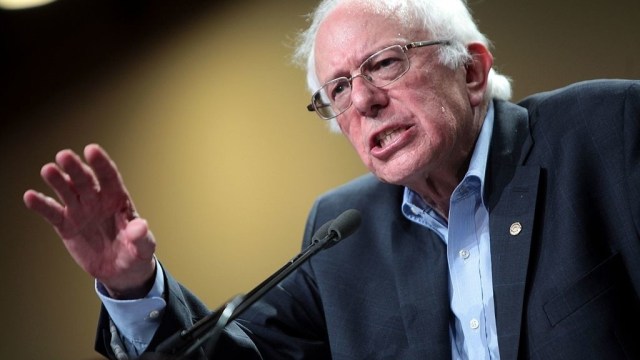Andrew Yang wants to tax Silicon Valley to fund universal basic income plan

Photo credit: Drew Angerer / GETTY
- Andrew Yang is a 2020 Democratic presidential candidate whose key campaign promise is to give every American adult $12,000, regardless of their current income.
- Yang said his universal basic income plan could be funded by a value-added tax levied on tech companies.
- Yang’s proposal has no shortage of critics, but he maintains that his UBI program would grow the economy by trillions of dollars.
Andrew Yang, the 44-year-old 2020 Democratic presidential candidate, says the U.S. economy needs to evolve into its next form, noting that automation and technology, such as driverless cars, are expected to displace millions of workers in coming years. To Yang, that new economy includes giving a $1,000 check every month to every American adult.
The lawyer-turned-tech executive outlined his form of a universal basic income program to George Stephanopoulos on ABC’s This Week on Sunday.
“We have to solve the problems that got Donald Trump elected in 2016,” Yang told ABC News Chief Anchor George Stephanopoulos on This Week Sunday. “And to me the main driver of his victory was that we automated away 4 million manufacturing jobs in Michigan, Ohio, Pennsylvania, Wisconsin, the swing states he needed to win.”
Yang, who’s earned a relatively small but dedicated base of #YangGang supporters, pointed to the Alaska Permanent Fund as proof that UBI programs can work in the U.S.
“Everyone in the state gets between $1,000 and $2,000 a year from oil money,” Yang said. “And because it’s oil money, there’s no stigma attached, it’s not a rich to poor transfer, and it’s wildly popular in a conservative state. […] So what we have to do is we make it a right of citizenship for all Americans and do what they are doing in Alaska with oil money, with technology money for everyone around the country.”
Yang said he’d fund his UBI program, dubbed the “Freedom Dividend,” with a value-added tax.
“What we have to do is, we have to join every other advanced economy and have a value added tax that would fall on the Amazons of the world, and because our economy is now so vast at $20 trillion, up $5 trillion in the last 12 years, a value added tax at even half the European level would generate over $800 billion in new revenue,” Yang told Stephanopoulos.
What’s a value-added tax?
A value-added tax is typically defined as a tax on the amount by which the value of a product has been increased at each stage of the production chain. Here’s a simpler explanation from tax expert William Gale taken from an interview he gave to The Atlantic:
“The example I always use is a loaf of bread you buy in a store for a buck — so you have a farmer, a baker, and a supermarket along the production chain. Let’s put the VAT at 10 percent.
1) The farmer grows the wheat and sells it to the baker for 20 cents. The VAT is 2 cents. The baker pays the farmer 22 cents, and the farmer sends 2 cents in VAT to the government.
2) The baker makes a loaf and sells it to the supermarket for 60 cents. The VAT is 6 cents. Now the supermarket pays the baker 66 cents, of which 6 is VAT. The baker sends the government 4 cents — he pays 6 cents in VAT but receives a two cent credit from the government.
3) The store sells the loaf to me for a dollar. I pay $1.10. The store sends the government 4 cents total – the 10 cents it collected in VAT on its sales, minus the 6 cents it paid to the baker in VAT, which it gets back in a credit. In total, the government gets 2 cents from the farmer, 4 cents from baker, 4 cents from the store. That’s 10 cents on a final sale of a dollar — for a 10 percent VAT.”
Why tax Silicon Valley?
The big winners of new technology are going to be companies like Amazon, not the American people, according to Yang. That’s a problem, considering the retail giant paid nothing in federal taxes last year.
“Is it Amazon’s fault that they paid zero in taxes?” Yang told MSNBC‘s Morning Joe in March. “No, it’s our fault.”
Amazon recently noted that it’s set to pay $756 million in state and international taxes this year, and that it “pays all the taxes we are required to pay in the U.S. and every country where we operate.”
As companies such as Facebook, Google, Uber, and Amazon benefit from A.I., millions of Americans are expected to lose their jobs. Yang said a third of the country will be at risk of permanent unemployment. Others in the tech industry paint a similarly stark picture, like Taiwanese venture capitalist and A.I. expert Kai-Fu Lee, who in January told CBS News’ Scott Pelley that he believes 40 percent of the world’s jobs will be replaced by robots that can automate blue-collar and even some white-collar jobs.
“Chauffeurs, truck drivers, anyone who does driving for a living — their jobs will be disrupted more in the 15–25 year time frame,” he said. “Many jobs that seem a little bit complex, chef, waiter, a lot of things will become automated.”
With these job losses looming over the horizon, Yang thinks Silicon Valley should “pay their fair share,” as he told MSNBC.
How a universal basic income would affect Americans
Yang said his program would offer not only a reprieve for displaced workers, but also space for people to pursue more meaningful work.
“If you have a little bit more freedom from scarcity, then you can start making moves towards the sort of work that you want for yourself, that you value, that you find fulfilling and exciting,” Yang said in an interview with Ben Shapiro.
Yang argues that removing financial pressure from Americans would allow more people to experiment with entrepreneurism, potentially leading to the creation of companies that create enormous value for the economy.
“You’re going to end up creating hundreds of thousands of new entrepreneurs, guaranteed, if you have something like the Freedom Dividend, because there are so many Americans who would love to take a shot,” Yang said in an interview with Kmele Foster of The Fifth Column podcast.
“Now, you could argue that, ‘Hey, maybe some of these people should not be being entrepreneurs […]’ But you’d wind up with a really significant number of diamonds in the rough, and the way our system works is that a number of diamonds could potentially create so much value that it doesn’t really matter what happens with the five people next to them. So, there would be, to me, if anything, an unlocking of human capital that would end up enhancing our system’s dynamism.”
Of course, Yang’s plan has many critics. Some say the math behind the Freedom Dividend doesn’t add up; others argue that giving Americans a UBI would make them lazy. It’s hard to predict what would happen, but one oft-cited UBI study conducted on the Alaska Permanent Fund offers a clue: The results showed no real impact on full-time employment rates, while part-time employment increased by 17 percent.
“It is reasonable to expect an unconditional cash transfer, such as a universal income, to decrease employment,” the authors said. “A key concern with a universal basic income is that it could discourage people from working, but our research shows that the possible reductions in employment seem to be offset by increases in spending that, in turn, increase the demand for more workers.”





